今天我想要分享我在 ACSCCTF 2025 成功解出的其中一題 please recover my files ,這題是一個Linux Memory Forensic 的題目,剛好用到了前一天分享的知識,趁這次鐵人賽的機會寫成 Writeup 跟大家分享解題思路
下載連結:
Volatility 2 : https://github.com/volatilityfoundation/volatility
Volatility 3 : https://github.com/volatilityfoundation/volatility3
經典的記憶體分析工具,利用指令可以分析 memory dump 中的關鍵訊息,像是進程、網路連線、檔案......等等。
基本的操作這邊推薦可以直接上網查有人整理好的指令doc
而Volatility分為2與3版,差別就是一個是要使用 python2 執行,另一個是用 python3 執行,並且現在Volatility 2 已經沒有在維護了,但是一些 Plugin 的完整度在目前為止還是比 Volatility 3 還要高並且豐富,所以有些人還是會比較會偏向使用 Volatility 2 ,今天分享會主要使用 Volatility 3
下載連結: https://hex-rays.com/ida-pro
經典反編譯工具, 可以將執行檔反編譯成人可以看懂的程式碼
網站連結: https://gchq.github.io/CyberChef/
非常好用的解密網站,支援多個加解密功能
這題的題意大致是,他發現了他的檔案被加密了,請恢復他,因此主要的目標是會需要找到怪怪的加密程式以及被加密的檔案,並分析他的加密程式是怎麼加密的並還原他。
起手式先看一下他的作業系統以及他的版本是多少
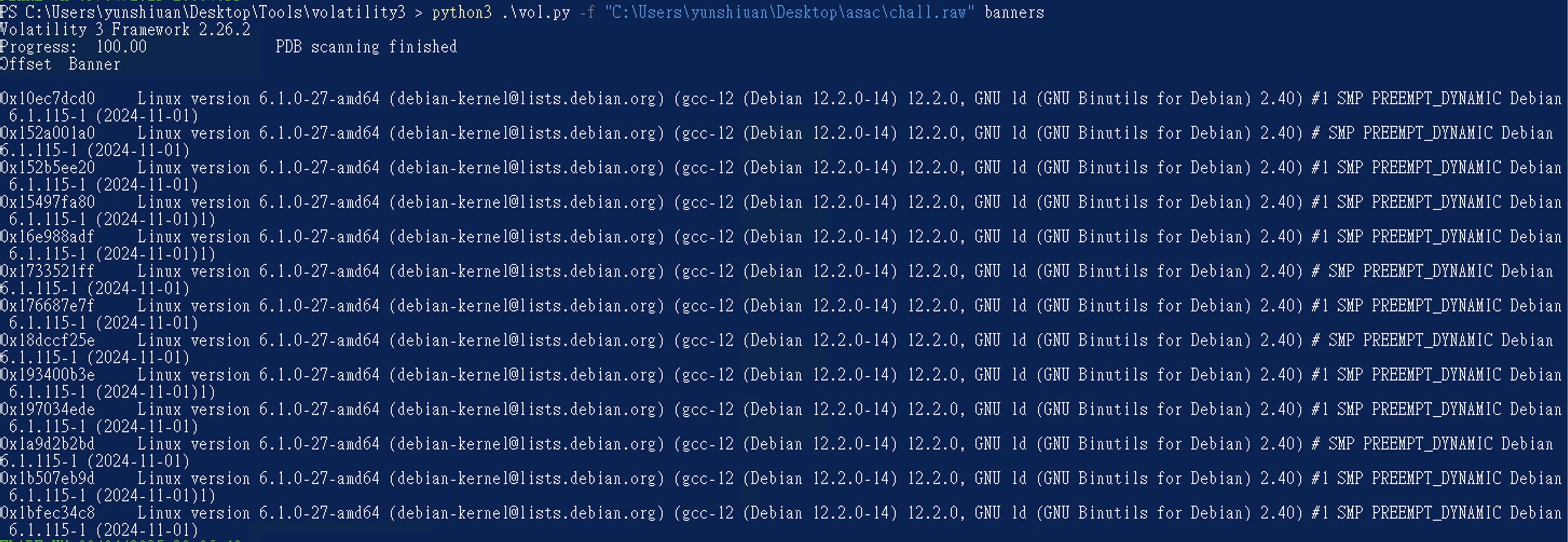
得知說這個 memory dump 的作業系統為 Debian,而他 Linux 核心版本是 6.1.0-27,並且他是2024-11-01出現的,試試看pslist有沒有辦法出現東西,但因為官方給的Sysbol Table太少,因此高機率會出現 Symbol Table 缺失錯誤

因此可以試試看前一天提到的 https://github.com/Abyss-W4tcher/volatility3-symbols 有人已經幫忙整理的 Symbol Table 找找看,這邊剛好他有。
因此把對應版本的 Symbol Table 下載下來後放在 Volatility 3 資料夾中的 volatility3\symbols\linux 路徑,再次用 pslist 看一下會不會成功。發現確實可以正常分析了
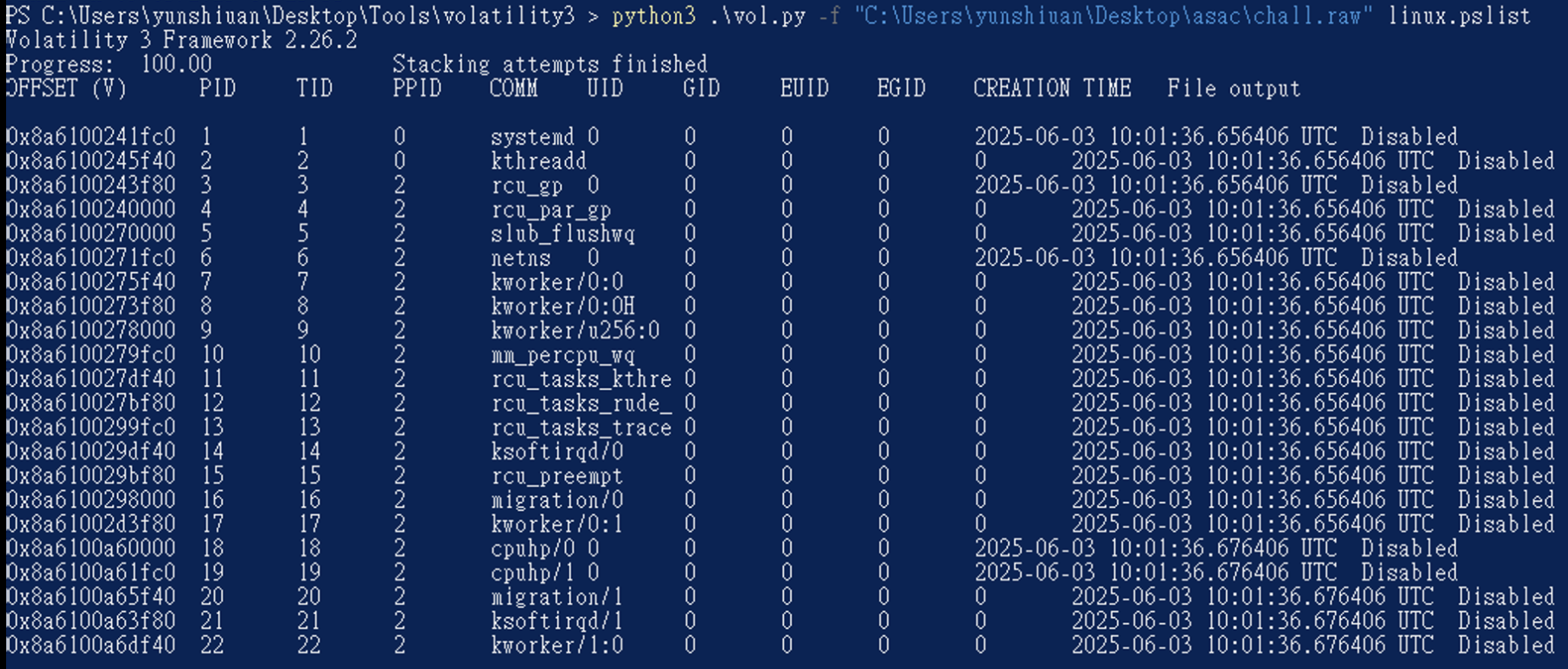
接下來下pstree 看一下有什麼值得看並且可疑的進程
PS C:\Users\yunshiuan\Desktop\Tools\volatility3 > python3 .\vol.py -f "C:\Users\yunshiuan\Desktop\asac\chall.raw" linux.pstree
Volatility 3 Framework 2.26.2
Progress: 100.00 Stacking attempts finished
OFFSET (V) PID TID PPID COMM
0x8a6100241fc0 1 1 0 systemd
* 0x8a611367bf80 356 356 1 systemd-journal
* 0x8a61015d5f40 388 388 1 systemd-udevd
* 0x8a610b808000 440 440 1 systemd-timesyn
* 0x8a6107958000 630 630 1 accounts-daemon
* 0x8a6107959fc0 631 631 1 anacron
* 0x8a610795bf80 632 632 1 avahi-daemon
** 0x8a610b823f80 646 646 632 avahi-daemon
* 0x8a61015d0000 633 633 1 cron
* 0x8a61159b5f40 634 634 1 dbus-daemon
* 0x8a61159b1fc0 636 636 1 low-memory-moni
* 0x8a61159b3f80 637 637 1 polkitd
* 0x8a610794df40 638 638 1 power-profiles-
* 0x8a6107948000 639 639 1 switcheroo-cont
* 0x8a6107949fc0 640 640 1 systemd-logind
* 0x8a610794bf80 641 641 1 udisksd
* 0x8a6107965f40 652 652 1 NetworkManager
* 0x8a6106740000 657 657 1 wpa_supplicant
* 0x8a6112083f80 674 674 1 ModemManager
* 0x8a61120a8000 693 693 1 cupsd
* 0x8a61120a9fc0 707 707 1 gdm3
** 0x8a6110c3bf80 1193 1193 707 gdm-session-wor
*** 0x8a610b80df40 1273 1273 1193 gdm-wayland-ses
**** 0x8a6108263f80 1283 1283 1273 gnome-session-b
* 0x8a6103590000 724 724 1 cups-browsed
* 0x8a61035a3f80 773 773 1 rtkit-daemon
* 0x8a6108a4df40 893 893 1 upowerd
* 0x8a610abfbf80 923 923 1 geoclue
* 0x8a610abf8000 930 930 1 packagekitd
* 0x8a6112e08000 938 938 1 colord
* 0x8a610a445f40 1205 1205 1 systemd
** 0x8a6108a4bf80 1208 1208 1205 (sd-pam)
** 0x8a61120a0000 1223 1223 1205 pipewire
** 0x8a6107658000 1228 1228 1205 wireplumber
** 0x8a6107453f80 1232 1232 1205 pipewire-pulse
** 0x8a610a438000 1234 1234 1205 dbus-daemon
** 0x8a610a43df40 1235 1235 1205 gnome-keyring-d
** 0x8a610a439fc0 1244 1244 1205 gvfsd
*** 0x8a6112e09fc0 2041 2041 1244 gvfsd-trash
** 0x8a6109c2df40 1258 1258 1205 gvfsd-fuse
** 0x8a6104c80000 1324 1324 1205 tracker-miner-f
** 0x8a6104c7df40 1332 1332 1205 gcr-ssh-agent
** 0x8a6104c78000 1333 1333 1205 gnome-session-c
** 0x8a6104c79fc0 1334 1334 1205 ssh-agent
** 0x8a6108265f40 1342 1342 1205 gnome-session-b
*** 0x8a61027c1fc0 1360 1360 1342 at-spi-bus-laun
**** 0x8a61027d1fc0 1373 1373 1360 dbus-daemon
*** 0x8a6108105f40 1540 1540 1342 evolution-alarm
*** 0x8a6112c89fc0 1569 1569 1342 gsd-disk-utilit
*** 0x8a6109a73f80 1574 1574 1342 gnome-software
** 0x8a61027c5f40 1361 1361 1205 gvfs-udisks2-vo
** 0x8a61027d0000 1365 1365 1205 gnome-shell
** 0x8a61027d3f80 1376 1376 1205 gvfs-gphoto2-vo
** 0x8a61027c0000 1385 1385 1205 gvfs-goa-volume
** 0x8a6107d43f80 1395 1395 1205 goa-daemon
** 0x8a6107b70000 1408 1408 1205 goa-identity-se
** 0x8a6107b75f40 1417 1417 1205 gvfs-mtp-volume
** 0x8a6107b10000 1422 1422 1205 gvfs-afc-volume
** 0x8a6107ba1fc0 1460 1460 1205 xdg-permission-
** 0x8a6107ba3f80 1463 1463 1205 gnome-shell-cal
** 0x8a610815df40 1475 1475 1205 evolution-sourc
** 0x8a6108161fc0 1486 1486 1205 gjs
** 0x8a61080e9fc0 1488 1488 1205 at-spi2-registr
** 0x8a6108163f80 1498 1498 1205 sh
*** 0x8a6112c8bf80 1568 1568 1498 ibus-daemon
**** 0x8a615b9e1fc0 1689 1689 1568 ibus-dconf
**** 0x8a615b9e0000 1690 1690 1568 ibus-extension-
**** 0x8a61111a0000 1759 1759 1568 ibus-engine-sim
** 0x8a6108171fc0 1501 1501 1205 gsd-a11y-settin
** 0x8a6108175f40 1502 1502 1205 gsd-color
** 0x8a6108173f80 1503 1503 1205 gsd-datetime
** 0x8a6108170000 1505 1505 1205 gsd-housekeepin
** 0x8a6108180000 1508 1508 1205 gsd-keyboard
** 0x8a6108181fc0 1512 1512 1205 gsd-media-keys
** 0x8a6108185f40 1518 1518 1205 gsd-power
** 0x8a6108183f80 1519 1519 1205 gsd-print-notif
** 0x8a61080f1fc0 1526 1526 1205 gsd-rfkill
** 0x8a61080f3f80 1527 1527 1205 gsd-screensaver
** 0x8a611118df40 1536 1536 1205 gsd-sharing
** 0x8a611118bf80 1537 1537 1205 gsd-smartcard
** 0x8a6111188000 1538 1538 1205 gsd-sound
** 0x8a6111189fc0 1539 1539 1205 gsd-usb-protect
** 0x8a61111a1fc0 1541 1541 1205 gsd-wacom
** 0x8a6112c95f40 1570 1570 1205 evolution-calen
** 0x8a615b86df40 1633 1633 1205 gjs
** 0x8a615b9cbf80 1684 1684 1205 evolution-addre
** 0x8a615b9cdf40 1700 1700 1205 ibus-portal
** 0x8a615b9f5f40 1712 1712 1205 gsd-printer
** 0x8a6112088000 1745 1745 1205 xdg-desktop-por
** 0x8a6109a90000 1758 1758 1205 xdg-document-po
*** 0x8a61661a5f40 1778 1778 1758 fusermount3
** 0x8a615bbf8000 1789 1789 1205 xdg-desktop-por
** 0x8a610745df40 1830 1830 1205 xdg-desktop-por
** 0x8a6108859fc0 2015 2015 1205 gnome-calendar
** 0x8a61035a1fc0 2017 2017 1205 gnome-control-c
** 0x8a61035a0000 2021 2021 1205 gnome-terminal-
*** 0x8a610b801fc0 2255 2255 2021 bash
**** 0x8a6107ba0000 2258 2258 2255 su
***** 0x8a6112c9df40 2259 2259 2258 bash
****** 0x8a6110c3df40 2272 2272 2259 avml
** 0x8a6103431fc0 2102 2102 1205 dconf-service
** 0x8a610b813f80 2261 2261 1205 su
** 0x8a6108868000 2279 2279 1205 gvfsd-metadata
* 0x8a6108f9bf80 1841 1841 1 fwupd
其中有趣的是在 102 行 他開了bash 後執行了 su ,之後底下又開了 bash 之後是 avml ,如果是bash的話有一個很不錯用的linux.bash Plugin 可以使用,它可以去看之前使用者在bash中輸入了什麼指令。
python3 .\vol.py -f "C:\Users\yunshiuan\Desktop\asac\chall.raw" linux.bash

看到超可疑的 su 了,因為一般下 su 不會使用./ 在現在位置執行,因此可重點去看這個 su 在幹嘛。
首先先看這個 su 到底在哪裡
python3 .\vol.py -f "C:\Users\yunshiuan\Desktop\asac\chall.raw" linux.pagecache.Files > files.txt

ok 找到了 發現他被放在/home/acsc/su ,接下來知道他在哪之後就可以把它 Dump 出來
python3 .\vol.py -f "C:\Users\yunshiuan\Desktop\asac\chall.raw" linux.pagecache.InodePages --find '/home/acsc/su' --dump

成功把 su dump 出來了之後就可以直接開 ida 分析
開 ida 然後點一點就可以發現到一個酷酷的加密函式
unsigned __int64 sub_403175()
{
unsigned __int64 result; // rax
char v1; // [rsp+0h] [rbp-240h]
char v2; // [rsp+0h] [rbp-240h]
char v3; // [rsp+0h] [rbp-240h]
int i; // [rsp+8h] [rbp-238h]
signed int v5; // [rsp+Ch] [rbp-234h]
unsigned int v6; // [rsp+10h] [rbp-230h]
signed int v7; // [rsp+14h] [rbp-22Ch]
__int64 v8; // [rsp+18h] [rbp-228h] BYREF
unsigned __int64 j; // [rsp+20h] [rbp-220h]
unsigned __int64 k; // [rsp+28h] [rbp-218h]
__int64 v11; // [rsp+30h] [rbp-210h]
__int64 v12; // [rsp+38h] [rbp-208h]
__int64 v13; // [rsp+40h] [rbp-200h]
__int64 flag_content_len; // [rsp+48h] [rbp-1F8h]
__int64 flag_content; // [rsp+50h] [rbp-1F0h]
__int64 v16; // [rsp+58h] [rbp-1E8h]
__int64 v17; // [rsp+60h] [rbp-1E0h]
__int64 v18; // [rsp+68h] [rbp-1D8h]
char v19[48]; // [rsp+70h] [rbp-1D0h] BYREF
__int64 v20; // [rsp+A0h] [rbp-1A0h]
char v21[48]; // [rsp+100h] [rbp-140h] BYREF
unsigned __int64 v22; // [rsp+130h] [rbp-110h]
char v23[16]; // [rsp+190h] [rbp-B0h] BYREF
char flag_filename[16]; // [rsp+1A0h] [rbp-A0h] BYREF
char filename[32]; // [rsp+1B0h] [rbp-90h] BYREF
char v26[32]; // [rsp+1D0h] [rbp-70h] BYREF
char v27[32]; // [rsp+1F0h] [rbp-50h] BYREF
char v28[40]; // [rsp+210h] [rbp-30h] BYREF
unsigned __int64 v29; // [rsp+238h] [rbp-8h]
v29 = __readfsqword(0x28u);
if ( (unsigned int)random_string(v23, 16LL) == 1 )
{
for ( i = 0; i <= 15; ++i )
{
v28[2 * i] = *(_BYTE *)(qword_8E6110 + (((unsigned __int8)v23[i] >> 4) & 0xF));
v28[2 * i + 1] = *(_BYTE *)(qword_8E6110 + (v23[i] & 0xF));
}
v28[32] = 0;
printf((__int64)&unk_8EA6C0, 40LL, (__int64)"AES_IV=%s", v28);
sub_6EF840(&unk_8EA6C0);
if ( (unsigned int)random_string(v26, 32LL) == 1 )
{
sub_403086(v26, v27, 32LL);
xorenc(filename, &debian_log_addr, 19LL);
v11 = sub_6FC8B0(filename, "wb");
if ( v11 )
{
fwrite(v27, 1LL, 32LL, v11);
fclose(v11);
v5 = open(filename, 0, v1);
if ( v5 >= 0 )
{
if ( !(unsigned int)sub_72C2D0((unsigned int)v5, v21) && (__int64)v22 > 0 )
{
v12 = mmap(0LL);
if ( v12 != -1 )
{
v13 = v12;
for ( j = 0LL; j < v22; j += 4096LL )
;
}
}
close(v5);
}
xorenc(flag_filename, &unk_7C1068, 15LL);
v6 = open(flag_filename, 2, v2);
if ( (v6 & 0x80000000) == 0 )
{
if ( (unsigned int)sub_72C2D0(v6, v19) || (flag_content_len = v20, (flag_content = malloc(v20)) == 0) )
{
close(v6);
goto LABEL_34;
}
if ( read(v6, flag_content, flag_content_len) != flag_content_len )
{
free(flag_content);
close(v6);
goto LABEL_34;
}
v16 = sub_402DEE(flag_content, flag_content_len, v26, v23, &v8);
free(flag_content);
if ( v16 )
{
if ( (unsigned int)sub_72CBA0(v6, 0LL) || sub_72C300(v6, 0LL, 0LL) < 0 )
{
free(v16);
close(v6);
goto LABEL_34;
}
write(v6, v16, v8);
free(v16);
v7 = open(flag_filename, 0, v3);
if ( v7 >= 0 )
{
if ( !(unsigned int)sub_72C2D0((unsigned int)v7, v21) && (__int64)v22 > 0 )
{
v17 = mmap(0LL);
if ( v17 != -1 )
{
v18 = v17;
for ( k = 0LL; k < v22; k += 4096LL )
;
}
}
close(v7);
}
}
close(v6);
}
}
}
}
LABEL_34:
result = v29 - __readfsqword(0x28u);
if ( result )
sub_72F780();
return result;
}
分析一下他的執行邏輯
for ( i = 0; i <= 15; ++i )
{
v28[2 * i] = *(_BYTE *)(qword_8E6110 + (((unsigned __int8)v23[i] >> 4) & 0xF));
v28[2 * i + 1] = *(_BYTE *)(qword_8E6110 + (v23[i] & 0xF));
}
char aAcsc2025[] = "acsc2025"
unsigned __int64 __fastcall sub_403086(__int64 a1, __int64 a2, unsigned __int64 a3)
{
unsigned __int64 result; // rax
char v5; // [rsp+1Ah] [rbp-Eh]
unsigned __int64 i; // [rsp+20h] [rbp-8h]
for ( i = 0LL; ; ++i )
{
result = i;
if ( i >= a3 )
break;
v5 = *(_BYTE *)(a1 + i) ^ aAcsc2025[i % 8];
if ( ((7 * (_BYTE)i + 13) & 1) == 0 )
sub_402D55();
*(_BYTE *)(a2 + i) = ((((unsigned __int8)i ^ 0x13) + v5) << (8 - ((i & 7) + 1))) | ((int)(unsigned __int8)((i ^ 0x13) + v5) >> ((i & 7) + 1));
}
return result;
}
__int64 sub_402D55()
{
int v0; // edx
__int64 result; // rax
int v2; // [rsp+0h] [rbp-8h]
int i; // [rsp+4h] [rbp-4h]
v2 = 305419896;
for ( i = 0; i <= 4; ++i )
{
v0 = i + 8 * v2;
result = v0 ^ (unsigned int)v2;
v2 ^= v0;
}
return result;
}
那這樣就可以整理等等解密的思路
這邊首先先將硬編碼的兩個字串XOR解密,這邊直接使用 Cyberchef
首先先處理第一個 xor 字串解密
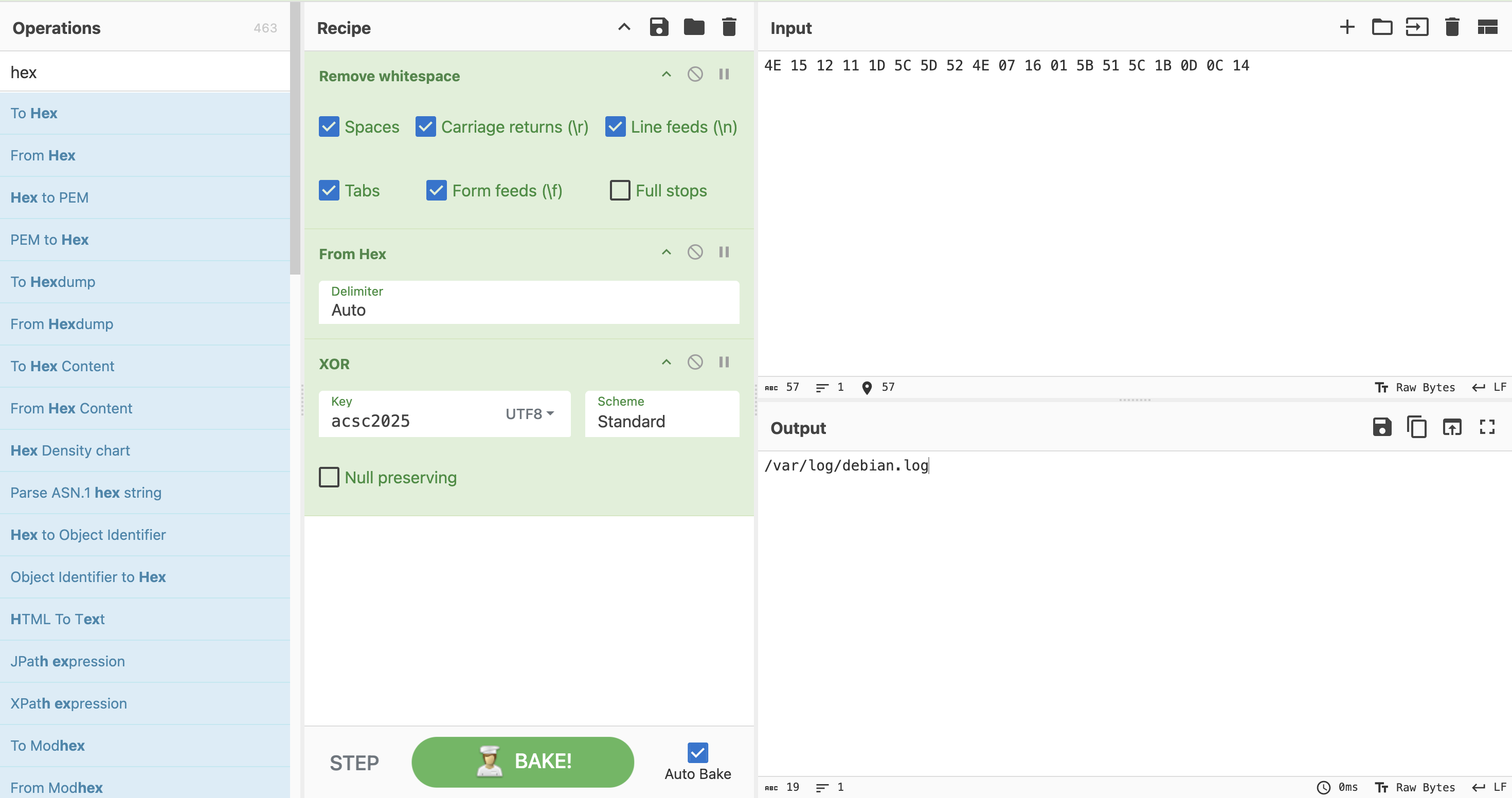
ok 知道了他會將隨機32 bytes 字串放進/var/log/debian.log中
現在解第二個xor解密字串
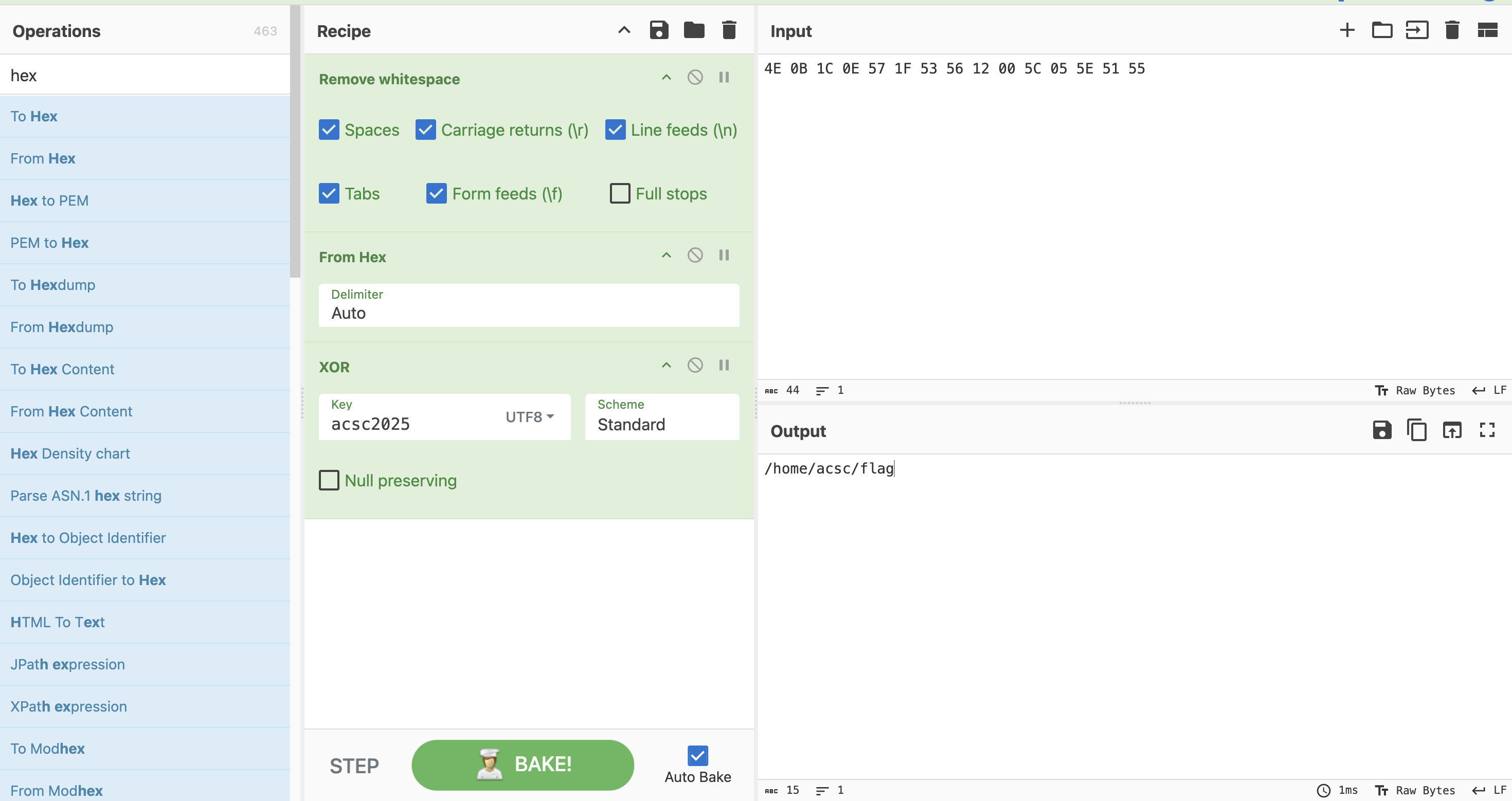
ok,這邊也得知道他會去/home/acsc/flag中將內容讀出來並加密他再寫回去。
有了以上資訊之後接下來要拿到 IV 與 KEY
加密過後的 IV 我們可以知道他會輸出到console 上,因此我們可以直接試試看strings 這個 linux 記憶體dump 他把它輸出的AES_IV=XXX抓下來
strings "C:\Users\yunshiuan\Desktop\asac\chall.raw" | Select-String -Pattern 'AES_IV'

成功抓到後,接下來寫解密腳本,這邊請AI代寫,把原本的隨機16 bytes 字串還原
#include <stdio.h>
#include <string.h>
#include <stdint.h>
#include <stdlib.h>
// Hex character lookup table (assuming standard hex characters)
char hex_chars[] = "0123456789ABCDEF";
// Function to decode hex string back to binary
void decode_hex_string(const char* hex_string, unsigned char* output, int length)
{
for (int i = 0; i < length; i++)
{
// Get high nibble (first hex character)
char high_char = hex_string[2 * i];
// Get low nibble (second hex character)
char low_char = hex_string[2 * i + 1];
// Convert hex characters to values
int high_val = 0, low_val = 0;
if (high_char >= '0' && high_char <= '9')
high_val = high_char - '0';
else if (high_char >= 'A' && high_char <= 'F')
high_val = high_char - 'A' + 10;
else if (high_char >= 'a' && high_char <= 'f')
high_val = high_char - 'a' + 10;
if (low_char >= '0' && low_char <= '9')
low_val = low_char - '0';
else if (low_char >= 'A' && low_char <= 'F')
low_val = low_char - 'A' + 10;
else if (low_char >= 'a' && low_char <= 'f')
low_val = low_char - 'a' + 10;
// Combine high and low nibbles
output[i] = (high_val << 4) | low_val;
}
}
// Function to encode binary to hex string (original encoding function)
void encode_hex_string(const unsigned char* input, char* output, int length)
{
for (int i = 0; i < length; i++)
{
output[2 * i] = hex_chars[(input[i] >> 4) & 0xF];
output[2 * i + 1] = hex_chars[input[i] & 0xF];
}
output[2 * length] = '\0';
}
int main()
{
// Given hex string
const char* hex_string = "33F27DE365AB35FFC29CB4FEEB506B34";
int hex_length = strlen(hex_string);
int binary_length = hex_length / 2;
printf("=== Hex Decoder ===\n\n");
printf("Input hex string: %s\n", hex_string);
printf("Hex string length: %d\n", hex_length);
printf("Expected binary length: %d bytes\n\n", binary_length);
// Allocate buffer for decoded data
unsigned char* decoded_data = malloc(binary_length);
if (!decoded_data) {
printf("Error: Memory allocation failed\n");
return 1;
}
// Decode hex string to binary
decode_hex_string(hex_string, decoded_data, binary_length);
// Print decoded data as hex
printf("Decoded binary data (hex): ");
for (int i = 0; i < binary_length; i++) {
printf("%02X", decoded_data[i]);
}
printf("\n\n");
// Print decoded data with spaces for readability
printf("Decoded binary data (hex with spaces): ");
for (int i = 0; i < binary_length; i++) {
printf("%02X ", decoded_data[i]);
}
printf("\n\n");
// Print decoded data as bytes
printf("Decoded binary data (bytes): ");
for (int i = 0; i < binary_length; i++) {
printf("%d ", decoded_data[i]);
}
printf("\n\n");
// Verify by re-encoding
char* reencoded = malloc(hex_length + 1);
if (reencoded) {
encode_hex_string(decoded_data, reencoded, binary_length);
printf("Re-encoded verification: %s\n", reencoded);
if (strcmp(hex_string, reencoded) == 0) {
printf("✓ SUCCESS: Re-encoding matches original!\n");
} else {
printf("✗ FAILED: Re-encoding does not match original!\n");
}
free(reencoded);
}
free(decoded_data);
return 0;
}
輸出為
=== Hex Decoder ===
Input hex string: 33F27DE365AB35FFC29CB4FEEB506B34
Hex string length: 32
Expected binary length: 16 bytes
Decoded binary data (hex): 33F27DE365AB35FFC29CB4FEEB506B34
Decoded binary data (hex with spaces): 33 F2 7D E3 65 AB 35 FF C2 9C B4 FE EB 50 6B 34
Decoded binary data (bytes): 51 242 125 227 101 171 53 255 194 156 180 254 235 80 107 52
Re-encoded verification: 33F27DE365AB35FFC29CB4FEEB506B34
✓ SUCCESS: Re-encoding matches original!
得知到IV = 33F27DE365AB35FFC29CB4FEEB506B34
那之前的資訊可以知道他會寫在/var/log/debian.log中,因此我們直接把他從記憶體dump 出來
python3 .\vol.py -f "C:\Users\yunshiuan\Desktop\asac\chall.raw" linux.pagecache.InodePages --find '/var/log/debian.log' --dump

成功dump 之後直後就可以寫解密還原key,這邊一樣AI代寫解密腳本
#include <stdio.h>
#include <string.h>
#include <stdint.h>
#include <stdlib.h>
// The key used in encryption
char aAcsc2025[] = "acsc2025";
// Decoy function (same as in encryption)
int64_t sub_402D55()
{
int v0; // edx
int64_t result; // rax
int v2; // [rsp+0h] [rbp-8h]
int i; // [rsp+4h] [rbp-4h]
v2 = 305419896;
for (i = 0; i <= 4; ++i)
{
v0 = i + 8 * v2;
result = v0 ^ (unsigned int)v2;
v2 ^= v0;
}
return result;
}
// Decryption function
uint64_t decrypt_data(int64_t encrypted_data, int64_t output_buffer, uint64_t length)
{
uint64_t result; // rax
char v5; // [rsp+1Ah] [rbp-Eh]
uint64_t i; // [rsp+20h] [rbp-8h]
for (i = 0LL; ; ++i)
{
result = i;
if (i >= length)
break;
// Get the encrypted byte
unsigned char encrypted_byte = *(uint8_t *)(encrypted_data + i);
// Calculate rotation amount (same as encryption)
int rotation_amount = (i & 7) + 1;
// Reverse the bit rotation
// Original: rotated = (value << (8 - rotation)) | (value >> rotation)
// Reverse: value = (rotated >> (8 - rotation)) | (rotated << rotation)
unsigned char rotated_value = (encrypted_byte >> (8 - rotation_amount)) |
(encrypted_byte << rotation_amount);
// Extract v5: v5 = rotated_value - (i ^ 0x13)
v5 = rotated_value - (i ^ 0x13);
// Call the decoy function if the same condition is met
if (((7 * (uint8_t)i + 13) & 1) == 0)
sub_402D55();
// Reverse the XOR with the key
*(uint8_t *)(output_buffer + i) = v5 ^ aAcsc2025[i % 8];
}
return result;
}
int main(int argc, char *argv[])
{
if (argc != 2) {
printf("Usage: %s <encrypted_file>\n", argv[0]);
return 1;
}
FILE *file = fopen(argv[1], "rb");
if (!file) {
printf("Error: Cannot open file %s\n", argv[1]);
return 1;
}
// Get file size
fseek(file, 0, SEEK_END);
long file_size = ftell(file);
fseek(file, 0, SEEK_SET);
printf("File size: %ld bytes\n", file_size);
// Read encrypted data
unsigned char *encrypted_data = malloc(file_size);
if (!encrypted_data) {
printf("Error: Memory allocation failed\n");
fclose(file);
return 1;
}
size_t bytes_read = fread(encrypted_data, 1, file_size, file);
fclose(file);
if (bytes_read != file_size) {
printf("Error: Could not read entire file\n");
free(encrypted_data);
return 1;
}
// Print encrypted data as hex
printf("Encrypted data (hex): ");
for (int i = 0; i < file_size && i < 50; i++) { // Show first 50 bytes
printf("%02x ", encrypted_data[i]);
}
if (file_size > 50) printf("...");
printf("\n");
// Allocate buffer for decrypted data
unsigned char *decrypted_data = malloc(file_size + 1);
if (!decrypted_data) {
printf("Error: Memory allocation failed\n");
free(encrypted_data);
return 1;
}
// Decrypt
decrypt_data((int64_t)encrypted_data, (int64_t)decrypted_data, file_size);
decrypted_data[file_size] = '\0';
// Print decrypted data
printf("\nDecrypted data:\n");
printf("As hex (continuous): ");
for (int i = 0; i < file_size; i++) {
printf("%02X", decrypted_data[i]);
}
printf("\n\n");
printf("As hex (with spaces): ");
for (int i = 0; i < file_size; i++) {
printf("%02X ", decrypted_data[i]);
}
printf("\n\n");
printf("As text (if printable): ");
for (int i = 0; i < file_size; i++) {
if (decrypted_data[i] >= 32 && decrypted_data[i] <= 126) {
printf("%c", decrypted_data[i]);
} else {
printf("\\x%02X", decrypted_data[i]);
}
}
printf("\n");
// Try to save decrypted data to a file
char output_filename[256];
snprintf(output_filename, sizeof(output_filename), "%s.decrypted", argv[1]);
FILE *output_file = fopen(output_filename, "wb");
if (output_file) {
fwrite(decrypted_data, 1, file_size, output_file);
fclose(output_file);
printf("\nDecrypted data saved to: %s\n", output_filename);
}
free(encrypted_data);
free(decrypted_data);
return 0;
}
輸出
File size: 32 bytes
Encrypted data (hex): 5a 47 47 78 19 cc 3e a3 26 58 2a 14 33 a0 40 d0 b6 c8 d0 e4 0b a3 d1 ea f5 df 65 83 0f 04 9f 36
Decrypted data:
As hex (continuous): C0685A143E2D38BA50244B4A753A31810B42F62D68D2D1D381165153E0C3F01F
As hex (with spaces): C0 68 5A 14 3E 2D 38 BA 50 24 4B 4A 75 3A 31 81 0B 42 F6 2D 68 D2 D1 D3 81 16 51 53 E0 C3 F0 1F
As text (if printable): \xC0hZ\x14>-8\xBAP$KJu:1\x81\x0BB\xF6-h\xD2\xD1\xD3\x81\x16QS\xE0\xC3\xF0\x1F
Decrypted data saved to: inode_0x8a6161fc0a78.dmp.decrypted
得知到KEY = C0685A143E2D38BA50244B4A753A31810B42F62D68D2D1D381165153E0C3F01F
知道了key跟IV之後,就可將flag檔案dump 出來並進行解密,這邊AES解密也是交給Cyberchef
C:\Users\yunshiuan\Desktop\Tools\volatility3 > python3 .\vol.py -f "C:\Users\yunshiuan\Desktop\asac\chall.raw" linux.pagecache.InodePages --find '/home/acsc/flag' --dump

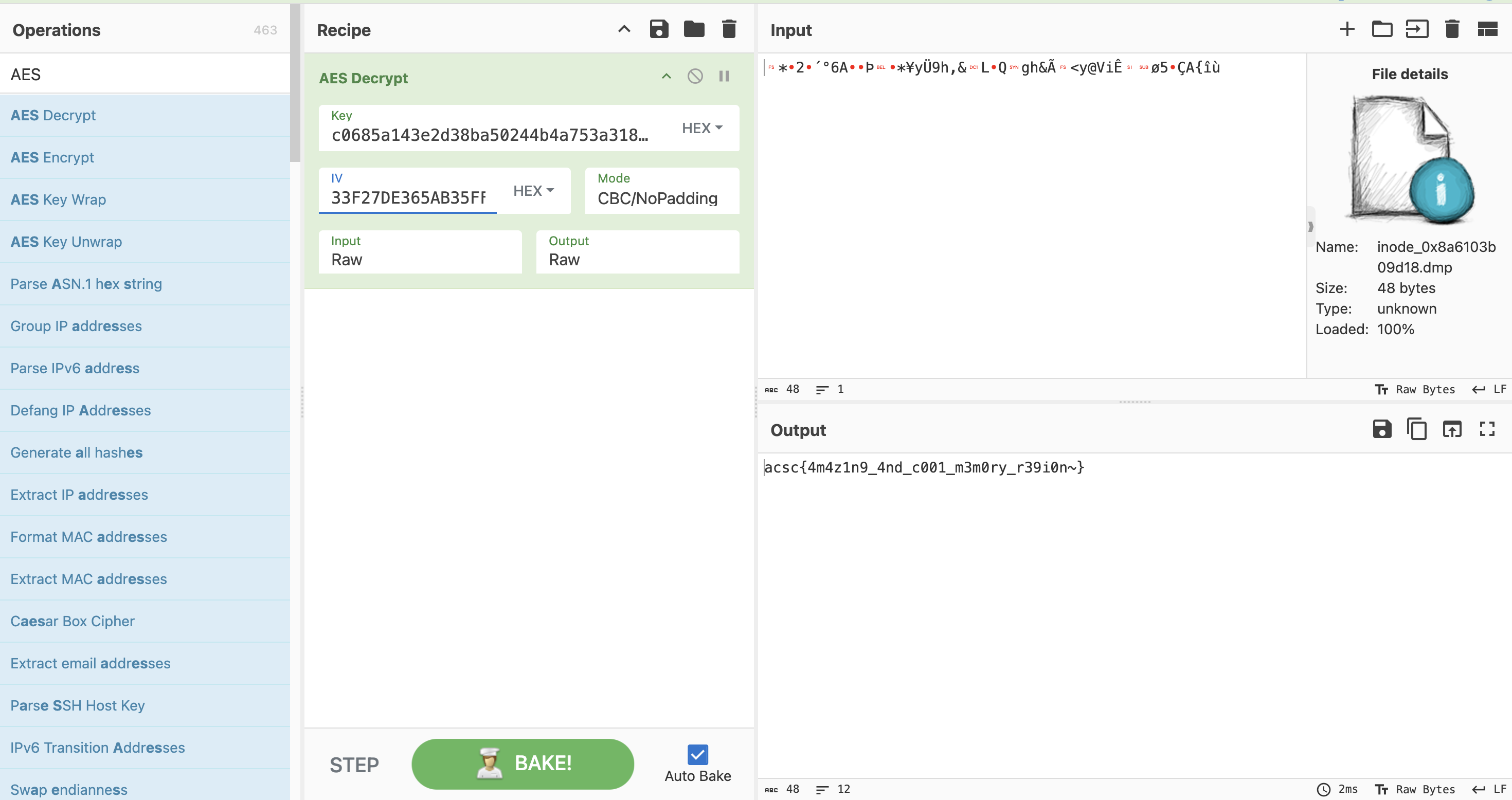
flag跑出來代表成功解出這題了!
我覺得這題是挺不錯的,包含了Linux Memory Forensic 以及逆向的能力,賽中解出這題的成就感挺大的,確實如果我之前沒有接觸過 Linux 記憶體分析的話可能就會先耗在處理錯誤的地方一段時間。
